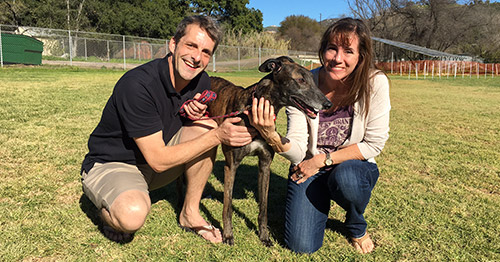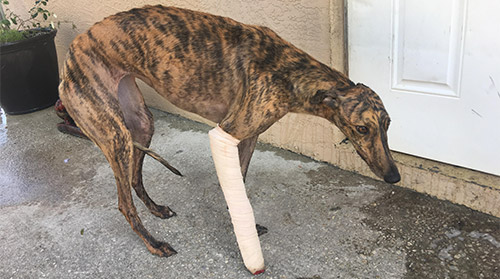 |
| Robert and Jennifer adopted Cortland the greyhound |
Recently, we
asked you to share your greyhound’s story. As with our annual calendar contest, we received entries describing lucky hounds who
had been adopted from anti-racing groups, pro-racing groups and groups that
claim no position on dog racing.
This is
something we must all celebrate!
In fact,
greyhound adoption should never be politicized. The only two questions that
should be raised in placing an unwanted puppy or a finished racer are 1) How
soon can this dog be transitioned out of the racetrack and 2) Where is the
closest, bona fide, adoption group
located?
Unfortunately, having
sensed its coming dissolution for nearly twenty years, the
commercial dog racing industry has begun holding greyhounds hostage and purposely
limiting access to select adoption groups. In an attempt to blunt criticism, such
groups may be required by contract
not to speak critically about racing. Nor can they tell
about the condition of the injured or sick greyhounds that they receive. Industry
bullying is so effective that groups even
refuse donations and avoid inclusion on any referral pages deemed to be against racing.
Sonia
Stratemann of Elite Greyhound Adoptions of South Florida learned the hard way that speaking out
rouses complaints not only from kennel operators but also from fellow adopters:
“In the past, I
only posted photos of dogs that looked good. If one came in that was especially
thin or injured, I usually just posted a head shot. For years, I took in sick
dogs that other groups would not and I always stayed quiet. But recently, I
posted about one dog’s condition on Facebook, and when another dog from
the same kennel was no longer wanted, he was left at a vet’s office to be
killed. Out of spite, the kennel worker had refused adoption! The only reason greyhound
Holly is still alive is because my friend begged for her life. Ironically, when
she dropped Holly off, my friend told me that she hoped I had finally “learned
my lesson” and to keep quiet! She hates racing too, but stays neutral to keep
them happy. Here’s a photo of Holly, seconds after arriving.”
This kind of psychological warfare must stop. As one adoption advocate
in the Pacific Northwest put it, “The racing industry has succeeded in coercing
many rescue groups into changing their public position on racing from 'against' to 'neutral.' These groups can’t even use the word 'rescue.' IMO, we should be
allowed to help regardless of our feelings about dog racing – pro or con –
ESPECIALLY if anyone is expected to believe the racing industry is
pro-greyhound.”
Another defense
mechanism used to prolong the cruelty of dog racing is the panic-inducing talking point that thousands
of greyhounds will die should a track or tracks close. It is true that the
number of dogs available for release increases in the wake of a track’s closure,
but that increase is temporary. The immediate problem is real, but it’s one
that is expected and can be prepared
for in advance. The benefits of a track closing are permanent and far-reaching.
This is because the cycle of over breeding and killing stops. For good. This is particularly important in Florida,
which has an abundance of dogs at breeding farms and racetracks throughout the
state. On November 6, when voters decide whether dog racing should be phased
out, the historic Miami track will already have stopped dog racing, three other
tracks will have ended their final season, and the remaining facilities will
have twenty-six months to wind down and release their dogs to waiting adoption
groups both in and out-of-state.
It is important
to understand that the recent claims by Florida kennel operators that dogs
“will be killed” is not a passive statement. This is all about control and anyone who utters these words is literally threatening to kill his or her
own dogs. Think about that. Just as
greyhound adoption groups are bullied, kennel
operators are now also trying to bully the general public into voting
against helping dogs.
Empty threats
like these must be considered for the scare tactic that they are. We have heard
the same cynicism in Massachusetts, New Hampshire, Arizona and every other
state that has rightfully voted to end commercial dog racing. When Tucson
Greyhound Park closed, for example, we worked directly with the track owners to fund adoption. In our home state of Massachusetts, there was a record
year for adoption following voter approval of the phase-out of dog racing.
Historically speaking,
when a dog track closes, countless volunteers are mobilized to find homes for
any and all displaced dogs. Drivers from hundreds of miles away
converge on the track and pick up dogs to be taken to adoption groups and
foster homes. For example, when Plainfield Greyhound Park
in Connecticut closed in 2005 volunteers from as far away as
the Midwest and Canada sent rescuers. The
closure of Multnomah Greyhound Park in Oregon in
2004 and Geneva Lakes Greyhound Park in Wisconsin in 2006
sparked a similar response. While some dogs were sent on to race
elsewhere, many others were made available for adoption.
Later, with the closure of Mile High
Park in Colorado (Winter 2008) and The Woodlands in Kansas (Fall
2008), all the dogs were safely moved out. Greyhound advocates,
including board members of GREY2K USA, joined hands with track adoption groups
to help the dogs. In December 2009, the 200 remaining dogs at Raynham
Park were re-homed, and a similar number had been transferred out of
Wonderland, also of Massachusetts, when that track held its last season in
September of that year.
It’s
no secret that greyhounds often pay with their lives while competing. They
break their necks, suffer paralysis and
some are even electrocuted. In Florida, state records show that an
innocent greyhound dies every three days. This cannot and should not go on.
Years ago, as I
first thought about this issue, I consulted with one of GREY2K USA’s founders,
Dr. Jill Hopfenbeck. She once served as the president of a local greyhound
adoption group and had treated over 1,000 rescued racers by that time. She
listened to me expressing at length my concern about the industry’s threat to
kill dogs should our 2008 Massachusetts
ballot question pass. She paused and then looked me straight in the eyes
and said with all the certainty of her many years of saving greyhounds:
“Christine, the best thing that can happen to a greyhound is for racing to end.
The injuries stop, the cages open and greyhounds get to become just dogs again.
Don’t ever forget that.”
Whether one
agrees with Jill or thinks dog racing is the best invention of 1919,
the truth is that we all love our greyhounds. Now it’s time to show it.
We applaud independent
networks like that the Greyhound
Adoption Action Alliance for saving dogs now and for preparing to help even
more greyhounds as tracks wind down operations in Florida. With the passage of Amendment 13 and as other tracks also close around the country, let’s work together to promote adoption and put the dogs first.


we have 5 Grays 2 hard to place dogs one is almost 12 years and 2 six years old and 1 nine.
ReplyDeletegreys need a home not a race track
We agree!!!
DeleteThis ammendment can't happen too soon, for me...for my late friend, Sue Law, who fostered greyhounds, this one is for you, your friends who campaign/ed so tirelessly and for all of the angel babies, out there, who deserve so much better!
ReplyDeleteI adore this blog. And I think the pro-racing people are doing the greyhounds harm by NOT letting adoption groups, such as Elite Greyhounds, have dogs. They are deplorable people, not thinking or considering the greyhounds, just themselves.
ReplyDelete